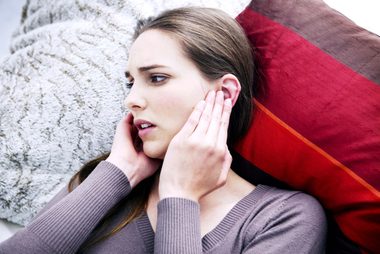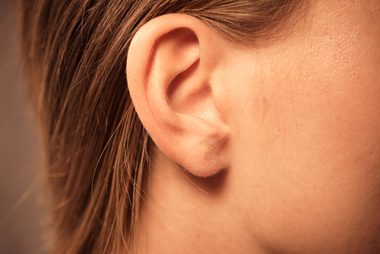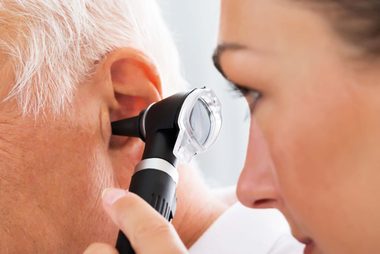
Why are your ears ringing?
“Your ears are telling you something when they’re ringing,” says Sean Kinden, a clinical audiologist in Gander, Newfoundland. “It’s their way of letting us know that something is not working quite the way it should be.”
Also known as tinnitus, ringing in ears affects adults young or old, it can be constant or intermittent, it can be extremely bothersome or a light background noise. And tinnitus can have many causes. But you shouldn’t go more than two weeks without getting it checked out by a doctor, says Kinden. Here’s what your ears may be trying to tell you.

“Turn that noise down!”
Exposure to loud sound is the most common cause of ringing in ears. People who work with noisy equipment like chainsaws, or who habitually play extra-loud music, are putting themselves at high risk for ringing. But you can take steps to protect yourself from damage. “If you’re out jogging, set your music volume at half,” says Kinden, “and wear hearing protection, even when mowing the lawn.” Don’t miss these signs of hearing loss.

“Time for a cleaning.”
Very often, a buildup of natural earwax (called cerumen) can block your ears and make you hear sounds that aren’t there. “Just have the wax removed by a physician,” says Kinden. “Once it comes out, the ringing is gone.” (Here’s what your earwax says about you.)

“You need to examine your noggin’!”
Bumped your head lately? Ringing in ears is one of the symptoms of concussion, especially if it’s one-sided. Other signs of concussion include headache, dizziness, and nausea. Always wear head protection when playing sports like hockey or working in a high-risk job like construction.

“See a dentist!”
A TMJ (temperomandibular joint) disorder occurs where the jawbone connects to the skull—not inside the ear—but it can still cause you to hear abnormal sounds. “In my standard interview with patients, I ask, have you had any dental work done? Are you having troubles with your jaw?” says Kinden. “For those, the dentist can actually help figure it out.” Your dentist wants you to know these 13 things.

“Get off pills”
Many kinds of medications cause ringing in ears, especially at higher doses (be sure to ask these questions before taking any medication). These include certain antibiotics, antidepressants, and even an overload of aspirin. “Luckily, with a lot of the medications, once you’re off the meds, the ringing goes away,” says Kinden.

“Blame the bone growth”
A hereditary disorder called otosclerosis causes bone in the middle ear to grow abnormally. That can lead to hearing loss and tinnitus, starting in your mid-30s. But luckily, it’s treatable with surgery. And if you know you have a family history of otosclerosis, you can often pick up on it early. Find out 11 surprising things that can ruin your hearing.

“Time for a medical check-up”
Ringing and roaring in the ears can be a symptom of a medical condition, like abnormal fluid pressure in the inner ear (Meniere’s disease), a non-cancerous tumor (acoustic neuroma), hypertension, diabetes or even allergies. If you’re not sure what’s causing the strange sounds in your ears, it’s time to have a chat with your health-care provider, and identify the underlying cause. Chances are, it can be treated.

“Chill out!”
Even stress can contribute to the ringing in ears. “Technically, emotional stress is not a cause,” says Kinden. “But it’s like an amplifier on your stereo. If something’s not going right, at the end of the day you’ll notice your tinnitus is louder.” Caffeine has a similar effect. Luckily, your hearing specialist can help you with strategies to reduce your symptoms. “The counseling portion is huge when it comes to tinnitus,” Kinden says. (Here’s how stress can actually make you sick.)

What if my ringing ears can’t be cured?
When damage to the ear is permanent, your tinnitus may be there for the long haul. But there are ways to manage it. A tiny device, worn in the ear like a hearing aid, can broadcast white noise to mask the ringing. The downside? It’s not always long-lasting. Another approach, called tinnitus-retraining therapy, teaches you to tune out the sound instead of trying to mask it. A device is programmed to play a sound you enjoy—like ocean waves or instrumental music—at the exact same frequency as the ringing. Eventually, you learn to desensitize yourself to the tinnitus sounds. “It takes hours and hours of training in a clinic, but it works!” says Kinden. Don’t miss these other tinnitus remedies for relief.